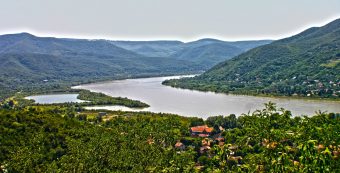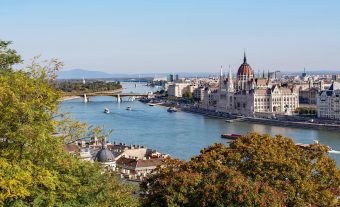
There are a lot of things Hungary has been doing in recent years that not only countries in the region but in the whole Europe can take as an example. Although there we should also include how successful they were combating the first wave of the Covid-19, we will keep our focus on the energy and ecology sector where Hungary in a short span of time has scored the impressive results. Above all, there is a record in environmental improving which has been noted as a huge success on a global level too. Even though there is no the separate Ministry for environmental protection, Hungarian Government introduced efficient measures and managed to save the habitats, clean the air in the cities and provide stable electricity supply with the increasing share of renewables, which in return brought some interesting scores, among which the fact that the purchase of vehicles on alternative fuels in the EU has increased the most in Hungary in the first quarter of this year. The Ambassador of Hungary in Serbia Attilával Pintér believes that they owe their success to an approach taken by the Government who doesn’t take and solve ecological problems as isolated cases but more like a mutual problem of all the sectors in the economy. He is equally assured that the cooperation between our two countries in the field of energy and ecology will improve the lives of all our citizens and promote European integration of Serbia.
EP: Hungary is currently on the 33rd place on the EPI list (Environmental Protection Index), and just two years ago you were on the 43rd place. How did you manage to improve the index in such a short notice, especially given that you are one of the four countries in the world which do not have an independent Ministry of Environmental protection?

Attilával Pintér: Yes, the EPI ranking is really impressive. Moreover, Hungary’s improvements in the field of environmental protection are also acknowledged by relevant international organizations. According to OECD, Hungary has made “significant progress” in decoupling its output economic growth from environmental pressures by gradually reducing greenhouse gas emissions. The Hungarian Government has introduced substantial measures in favor of meeting targeted environmental objectives, not only in a narrow sense but also within other economic sectors. In the case of complex environmental issues, the measures must be implemented in all relevant sectors in order to improve the state of the environment significantly. I believe that the EPI ranking also attests to the success of integrating environmental policy as a cross-cutting/cross-sectoral issue. The Hungarian Government is working on and allocating considerable resources in favor of fostering economic development while maintaining and sustainably utilizing natural resources. For this purpose, responsible ministries cooperate closely and endeavor to prevent the emergence of environmental problems. These problems are not only isolated cases. Therefore, we are implementing a comprehensive environment policy planning.
EP: According to this ranking, the weakest points of Hungary in terms of environmental protection are the loss of forests and wetlands as well as the air quality. What are the plans for tackling these problems?

Attilával Pintér: The mentioned -4.1 percent change within 10 years in a forested area is based on the Global Forest Watch data, which in our opinion is inherently less capable to provide reliable information on forest cover changes in the case of smaller countries. Hungary has nearly doubled its forest area since the post-World Wars era – increasing its forest land from 12 percent to 21 percent (1,867,479 ha in 2018), reflecting a significant increase. Forests are under strict legal protection in Hungary, reinforced by our strategic vision to continue the cultivation work. Guided by such aims, we increased the unit prices of afforestation subsidies in 2019 and launched a national program to increase areas with tree cover. Our latest campaign for increasing areas covered by forests has been just launched on 11 September by our Minister of Agriculture. From 2007 onwards, more than 75 billion HUF (approx. 210 million EUR) have been invested into, among others, restoration of degraded natural habitats – including wetlands and forests and into improving the efficiency of habitat management. The focus of these projects is mostly the remaining parts of our formerly vast grasslands that often create a mosaic-like pattern with wetland habitats. It is of utmost importance to maintain the achieved good condition after habitat restoration. One of the key instruments to this end is livestock pasturing (Hungarian Grey Cattle, Water Buffalo, Racka Sheep or Hucul Horses), which also serves gene preservation purposes. Water deficiency and a disturbed hydrological regime are problematic both in grasslands and in wetlands. Numerous projects aim at ensuring water supply in some of Hungary’s large wetlands, such as mortlakes, bogs and lakes. Air quality in Hungary generally corresponds to the EU average. However, it does not mean that we can be relaxed at this regard. Moreover, air quality improvement requires concerted national and international efforts from various sectors such as the energy sector, transportation, agriculture, industry or households. Both households and the mobility sector have huge potential for further improvments. Increasing electromobility is a key policy objective in Hungary. We are also taking steps to introduce green buses in our public transport system. The national bus strategy aims to replace the 7,500 buses used in public transport in the next 10 years with new buses that meet environmental criteria with at least 50 percent domestic added value, so passengers should be able to travel with green buses. Emissions caused by household heating also presents a challenge for us, for which we launched the socalled “Heat wise!” awareness-raising campaign. With the timely implementation of our National Air Pollution Control Program, ambitious emission reduction obligations can be fulfilled, and air quality is expected to improve
EP: Hungary is planning to phase out coal-fired electricity generation by 2050 to help reduce emissions and tackle climate change. Does that goal in 2020 seem achievable?
Attilával Pintér: Based on the latest currently available Eurostat data, Hungary is meeting its share of renewable energy over its time-proportionate commitment. The RES share was 12.5 percent in 2018, which is close to the 13 percent plan for 2020. There has been a spectacular increase in the renewable electricity sector and the renewable share in the transport sector is steadily increasing, too. The most dynamic growth has been shown by solar energy. Photovoltaic power generation is expected to double every year, just as it has in the past four years. We also want to give new inputs to the expansion of geothermal energy use.
EP: A Hungarian enterprise has started to produce solar collecting pavement blocks from recycled plastic, and even the international press caught attention. Do you have similar patents which are environmentally friendly?

Attilával Pintér: Yes, the great thing in the so-called Patio panels is that they are 90 percent made of recycled materials, which is to be further improved to 100 percent. With this invention the Hungarian enterprise got to the list of New Europe 100, that ranks the most promising start-ups. Such smart eco-innovations have great potential both to tackle environmental problems and to create new business opportunities. I think we can be proud of our internationally acknowledged scientists and patents invented by them during the course of history. There are several initiatives, technical solutions for improving environmental quality. To mention one, a Hungarian engineer has invented a radically new procedure to make car washing more environmentally-friendly. Based on nanotechnology, the new method removes dirt stuck onto the hood of a car with using 1.5 decilitres of water and a tissue paper. There is an endless list of great ideas. Let me draw your attention to the Budapest Sustainability EXPO and Summit 2021, where we are expecting to welcome enterprises from all around the world with their innovative products or services that can solve environmental problems. I truly hope that Serbian companies will be interested and use the exhibition to find business opportunities.
Interview by: Nevena Djukic
Read the whole interview in the new issue of the Energy portal Magazine SUSTAINABLE TRANSPORT, september-november, 2020.

